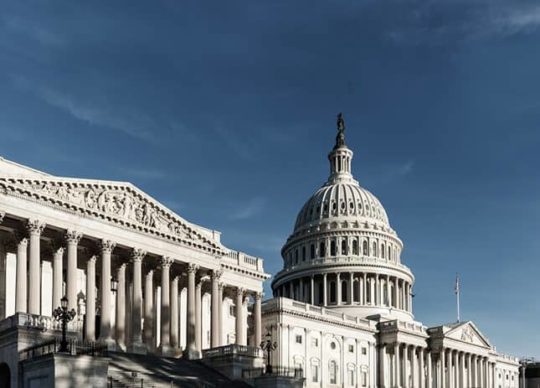The year 2022 brings a renewed call for policy reforms that ensure an inclusive workforce and equal opportunity for all so that immigrants, refugees, and international students no longer face barriers to advancing in their careers in the United States.
Immigrants and refugees make up 17 percent of the U.S. labor force, and nearly half of recently arrived immigrants and refugees hold a bachelor’s degree or higher. International students are vital contributors to the U.S.—they create jobs, drive innovation, and enrich our campuses and communities. In the 2020-2021 academic year alone, international students created 306,308 jobs and contributed $28.4 billion to the U.S. economy.
Federal, state, and local policymakers have the opportunity to prioritize efforts to ensure that immigrants, refugees, and international students can achieve their educational and career goals in the U.S. WES offers five policy priorities for 2022—a roadmap toward an inclusive workforce as part of the U.S. economic recovery.
PRIORITY 1: Address systemic barriers that limit the employment opportunities of immigrants and refugees who hold international credentials.
As the U.S. workforce faces growing demands, and employment gaps deepen in critical sectors, an estimated two million immigrants and refugees with relevant training and education are unemployed or underemployed. Sixty percent hold international credentials. Systemic factors like insufficient contextualized English-language learning, lack of effective workforce development training, and limited recognition of international credentials all contribute to underemployment. An estimated 263,000 immigrants and refugees have health-related credentials and experience that are underutilized.
There are opportunities for policymakers to take action:
- Congress must advance the bipartisan Bridging the Gap for New Americans Act. This legislation calls on the U.S. Department of Labor to conduct a study of the systemic barriers that drive the unemployment and underemployment of immigrants and refugees who hold international credentials, and to issue recommendations for reform.
- States should reform occupational licensing laws to recognize international credentials. Legislation in some states offers promising models: Last year, Washington created pathways for qualified internationally trained doctors to practice; a bill pending in Utah would create licensing pathways for internationally trained nurses, and legislation recently introduced in Colorado would open pathways to licensure for internationally trained doctors. In the education sector, legislation pending in Virginia would extend provisional teaching licenses to eligible immigrants and refugees.
PRIORITY 2: Support inclusive communities and workforces that champion immigrants and refugees.
Immigrants and refugees are prepared to contribute valuable education and experience to local workforces, but the U.S. currently lacks a national strategy to ensure the availability of training and career navigation support. Some states and localities have pioneered effective programs and policies to advance workforce inclusion yet states often lack a central hub to facilitate the coordination of services, outreach to service providers, and development of policies aimed at promoting inclusion. Federal, state, and local Offices of New Americans (ONAs) can meet these challenges.
WES calls for an expanded network of ONAs at the city and state level–and supports the creation of a federal ONA at the White House. Federal and state lawmakers should pass the following legislation:
- Congress should support the New Deal for New Americans Act and the National Office of New Americans Act, both of which call for the creation of a White House ONA. A White House ONA would build on the efforts of the Task Force on New Americans launched under the Obama administration, and strengthen state and local ONAs.
- States can expand the impact of ONAs in local communities. Pennsylvania and California should pass pending legislation to establish ONAs and join 11 states with statewide offices dedicated to immigrant and refugee inclusion. State ONAs offer models to other communities interested in supporting state-level, cross-sector immigrant and refugee inclusion initiatives.
PRIORITY 3: Promote economic mobility as part of the U.S. refugee resettlement framework.
The U.S. commitment to welcome refugees must include efforts to support refugees’ full inclusion in the U.S. workforce and economy. Time-bound financial assistance, a focus on rapid attachment to the workforce regardless of whether a job is commensurate with a job seeker’s experience, and a limited understanding of the unique barriers facing newcomers who hold international credentials all lead to the systemic underemployment of refugees. As communities across the nation welcome Afghans seeking refuge, there is an urgent call for reform and to open pathways to high-demand careers and economic mobility.
WES calls for the Office of Refugee Resettlement (ORR) to expand and strengthen its Refugee Career Pathways programs. State leaders can also develop policies to ensure that individuals seeking safety in the U.S can reach their career and educational goals as well. Here are more opportunities to take action:
- The Biden administration should launch a pre-arrival career pathway initiative, offering online training programs, virtual networking opportunities, and vocational English-language learning to refugees who have been approved for resettlement. The pre-arrival waiting period, which can often take months, offers an opportunity to support refugee inclusion in the workforce.
- State and local leaders can build on promising models from states like Vermont, which created a local assessment of training, apprenticeship, and mentoring needs for refugees; and New York, where investments in refugee-focused career coaching and digital literacy programs are made via grants from the state’s ONA.
PRIORITY 4: Invest in workforce development and adult education.
With record numbers of job openings and labor turnover, U.S. employers are struggling to hire qualified workers. Workforce investments, particularly those that reflect the needs and potential of immigrant and refugee workers, are vital to the success of our economic recovery. Yet workforce and adult education programs often do not consider the unique needs of the one U.S. worker in six who is an immigrant.
WES calls for greater public investments in programs that support the workforce integration of immigrants and refugees, including the following:
- The Biden administration should coordinate efforts and increase funding to strengthen and expand adult education and workforce development programs, tailoring investments to meet the needs of immigrant and refugee workers. Priority investments include contextualized English-language programs, industry-recognized apprenticeship programs, and wraparound services for immigrant and refugee job seekers.
- State leaders can replicate the promising efforts of states like Texas, where a statewide workforce commission has prioritized the needs of internationally trained immigrants and refugees with funding for credential evaluation and customized career counseling. Maine and Minnesota have allocated public funds to support internationally trained professionals in applying for occupational licenses. Maine has also expanded workforce development programming to support access to English-language programs.
PRIORITY 5: Renew the United States’ commitment to welcome international students.
International students enrich campuses and communities across the country, creating jobs and driving innovation. Yet international student enrollment has dropped since the 2016/17 academic year, following the implementation of restrictive immigration policies and the COVID-19 pandemic. Longer-term factors also drive the decline: Although many international students prefer to study in countries where they will eventually be able to build a career, post-graduation career pathways for international students are limited in the U.S.
Students interested in remaining in the U.S. post-graduation may apply for Optional Practical Training (OPT), a temporary opportunity limited to 12 months in most fields. However, proposals to increase work authorization (EAD) fees associated with this program could put it out of reach for international students. Employment-based green cards present a second option for students to stay in the U.S., but the application process requires sponsorship from an employer and is plagued by significant backlogs. In 2021, nearly 1 million employment-based green card applicants were waitlisted.
WES calls for policies that create more accessible pathways for international students to meet both their education and career goals in the U.S. The following are opportunities to promote international student enrollment in U.S. universities—and provide more post-graduation options for students to apply their education and training to local economies.
- The Biden administration must take steps to address ongoing, significant delays related to processing student visas. WES supports recommendations outlined in an August 2021 Senate letter, including the creation of alternatives to in-person visa interviews and investing in additional U.S. consular personnel to address processing delays.
- WES supports recommendations proposed in the Joint Statement of Principles in Support of International Education issued by the U.S. Department of State and Department of Education and calls on the Biden administration to continue to take action to support a renewed focus on international education by implementing the recommendations laid out in the statement.
- WES supports the recent policy changes announced by the Biden administration to strengthen opportunities for international STEM students and scholars to “contribute to innovation and job creation efforts across America.” Congress and the Biden administration should build on these policy reforms. Immediate steps must include limiting proposed fee increases associated with current practical training programs, including EAD application fees for OPT—which are set to more than double under current legislative proposals— and expanding opportunities for international students to apply their education and skills to the U.S. workforce.
The U.S. must take bold, decisive action to create equitable pathways to achieving education and career goals. The education, experience, and talents of immigrants, refugees, and international students are vital to the nation’s immediate workforce needs and its long-term economic vitality and stability.
Check out the IMPRINT Policy Tracker for more information on federal and state policies aimed at removing economic mobility barriers impacting immigrants and refugees.


